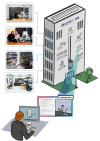Differences
This shows you the differences between two versions of the page.
| Both sides previous revisionPrevious revisionNext revision | Previous revisionNext revisionBoth sides next revision | ||
| team:daniel_nyga [2017/04/13 13:35] – [Teaching] nyga | team:daniel_nyga [2017/06/29 08:20] – [Dr.rer.nat. Daniel Nyga] nyga | ||
|---|---|---|---|
| Line 1: | Line 1: | ||
| ~~NOTOC~~ | ~~NOTOC~~ | ||
| - | =====Daniel Nyga, M.Sc. (TUM)====== | + | =====Dr.rer.nat. Daniel Nyga====== |
| | {{: | | {{: | ||
| - | |::: ||Research | + | |::: ||Research |
| |:::|Room: |1.77| | |:::|Room: |1.77| | ||
| - | |:::|Tel: |--49 -421 218 64008| | + | |:::|Tel: |--49 -421 218 64010| |
| |:::|Fax: |--49 -421 218 64047| | |:::|Fax: |--49 -421 218 64047| | ||
| |:::|Mail: |< | |:::|Mail: |< | ||
| Line 10: | Line 10: | ||
| ====About==== | ====About==== | ||
| - | Before I joined | + | Daniel Nyga is a postdoctoral researcher at the Institute for Artificial Intelligence |
| - | I'm working on the import | + | ====Dissertation==== |
| + | [[http:// | ||
| + | has been one of the ultimate long-standing goals in both Artificial | ||
| + | Intelligence and Robotics research. In near-future applications, | ||
| + | robotic assistants and companions | ||
| + | commands such as " | ||
| + | breakfast", | ||
| + | instructions are only vaguely formulated, complex sequences of | ||
| + | sophisticated and accurate manipulation activities need to be carried | ||
| + | out in order to accomplish | ||
| + | knowledge | ||
| + | of natural-language instructions from the Internet has garnered a lot | ||
| + | of attention within the last decade. However, natural language | ||
| + | typically massively unspecific, incomplete, ambiguous and vague and | ||
| + | thus requires powerful means for interpretation. | ||
| + | This work presents PRAC -- Probabilistic Action Cores -- an | ||
| + | interpreter for natural-language instructions which is able to resolve | ||
| + | vagueness and ambiguity | ||
| + | information pieces that are required | ||
| + | executable by a robot. To this end, PRAC formulates the problem of | ||
| + | instruction interpretation as a reasoning problem in first-order | ||
| + | probabilistic knowledge bases. In particular, the system uses Markov | ||
| + | logic networks | ||
| + | A novel framework for reasoning about unmodeled symbolic concepts is | ||
| + | introduced, which incorporates ontological knowledge from taxonomies | ||
| + | and exploits semantically similar relational structures in a domain of | ||
| + | discourse. The resulting reasoning framework thus enables more compact | ||
| + | representations of knowledge and exhibits strong generalization | ||
| + | performance when being learnt from very sparse data. Furthermore, | ||
| + | novel approach for completing directives is presented, which applies | ||
| + | semantic analogical reasoning to transfer knowledge collected from | ||
| + | thousands of natural-language instruction sheets to new situations. In | ||
| + | addition, a cohesive processing pipeline is described that transforms | ||
| + | vague and incomplete task formulations into sequences of formally | ||
| + | specified robot plans. The system is connected to a plan executive that | ||
| + | is able to execute the computed plans in a simulator. Experiments | ||
| + | conducted in a publicly accessible, browser-based web interface | ||
| + | showcase that PRAC is capable of closing the loop from | ||
| + | natural-language instructions to their execution by a robot. | ||
| - | My work aims at building up action-specific knowledge bases from various knowledge sources, such as natural language, | + | ====Projects==== |
| + | Daniel Nyga's research interests revolve around topics on Artificial Intelligence and Data Science in general, as well as Machine Learning, Data Mining and Pattern Recognition techniques. In particular, he is interested in probabilistic graphical and relational knowledge representation, | ||
| - | {{research:actioncore.png? | + | He was involved in the European FP7 research |
| - | Knowledge about actions and objects | + | He is the lead developer in the projects [[http:// |
| - | + | ||
| - | I am involved in the European research projects [[http:// | + | |
| - | + | ||
| - | I am also the lead developer in the projects [[http:// | + | |
| - | + | ||
| - | If you are interested in a student project in any of the above topics, please contact me via E-Mail or just drop into my office. | + | |
| + | His GitHub profile can be found [[http:// | ||
| Line 36: | Line 70: | ||
| * Data Mining/ | * Data Mining/ | ||
| * Automated Learning/ | * Automated Learning/ | ||
| - | * Natural-Language Understanding | + | * Natural-language understanding |
| ====Teaching==== | ====Teaching==== | ||
| Line 64: | Line 98: | ||
| < | < | ||
| </ | </ | ||
| + | |||
Prof. Dr. hc. Michael Beetz PhD
Head of Institute
Contact via
Andrea Cowley
assistant to Prof. Beetz
ai-office@cs.uni-bremen.de
Discover our VRB for innovative and interactive research

Memberships and associations:











